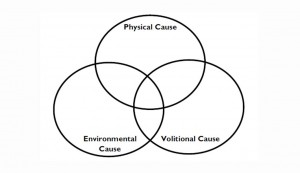To help you assess how you currently think about mental illness, let me invite you to participate in an exercise. Take the list of struggles commonly known as mental illnesses and place them in the appropriate place on the Venn diagram below. Use the overlapping segments of the circles to indicate where you believe there are multiple causal factors involved.
If any of these terms are new or confusing to you, ignore them and practice with the one’s you already know. This is not the time to expand your therapeutic vocabulary. (I apologize for poor image quality of the Venn diagram, but it should still be able to serve its purposes.)
Alzheimer’s Disease; Anorexia and Bulimia; Anti-Social Personality Disorder; Anxiety; Asperger’s Disorder; Attention Deficit Disorder; Bipolar Disorder; Compulsive Gambling; Depression; Dyslexia; Hallucinations; Narcissism; Obsessive-Compulsive Disorder; Paranoia; Post-Traumatic Stress Disorder; Post-Partum Depression; Pyromania; Schizophrenia; Seasonal Affective Disorder; Social Anxiety Disorder; Sleep Disorders; Substance Abuse / Addiction
“Christians don’t understand how physical, psychological, and spiritual realms interrelate because Satan muddies the boundaries. Many of our troubles are caused because we think a problem is spiritual when it is physical or we think a problem is physical when it is emotional or spiritual (p. 207-208).” D. Martyn Lloyd-Jones in The Christian Warfare
As you seek to identify the primary or initial cause of each struggle, many of them naturally find their place.
- Post-traumatic stress is clearly caused by the environmental influences.
- Substance abuse and addiction begin with choices by the individual that become life-dominating.
- Post-partum depression is obviously rooted in physical changes and stresses related to pregnancy and child birth.
However, others seem to almost always overlap in their origin.
- Anti-Social Personality Disorder involves many personal choices but also correlates strongly with a harsh upbringing.
- Attention Deficit Disorder has strong influences from both biology (brain) and environment (parenting and stimulation related to technological entertainment).
- Obsessive Compulsive Disorder appears to be rooted in both brain physiology and personal choices-beliefs-values.
We begin to see that other struggles may be caused by any one or all three of these areas.
- Depression-related struggles can have their origin in any or all of these circles.
- Anxiety-related struggles can have their origin in any or all of these circles.
- Sleep disorders can have their origin in any of these circles.
To complicate things further, the same individual can have multiple struggles (i.e., post-traumatic stress, a learning disability, and substance abuse), each of which have different origins but which feed into one another. How to prioritize multiple diagnoses goes beyond the scope of this presentation. But it reminds us that people are never as neat as whatever categories we devise to understand them.
If it is this complicated, should the church (or any group of non-professional people) take an always-refer position that limits meaningful conversation about this subject? No, that would be unhelpful, unloving, and impossible. Why?
- We all have a theory of mental illness whether it is a good-accurate one or not.
- We struggle. This is not an us-them subject. We will all face these types of struggles at some point.
- Our everyday conversations pass along some culture and “common sense” about mental illness.
- For better or worse, people take what they learn in the church and apply it to their mental illness.
- Simplistic hope (hope that is simpler than reality permits) is actually a false hope and the church, of all institutions, wants to be leery of offering false hope (Jeremiah 8:11).
If the church ignores this conversation, several negative consequences will be strengthened.
- The stigma related to mental illness will be reinforced.
- An excellent we all should have in the church – authentic and healthy relationships – will be negated.
- The discussion of mental illness will continue to grow more professional and secular.
- People will live as if God has little concern about their emotions, at least the unpleasant ones.
- We will miss an important opportunity to disciple people on how to engage with sin and suffering in this world.
